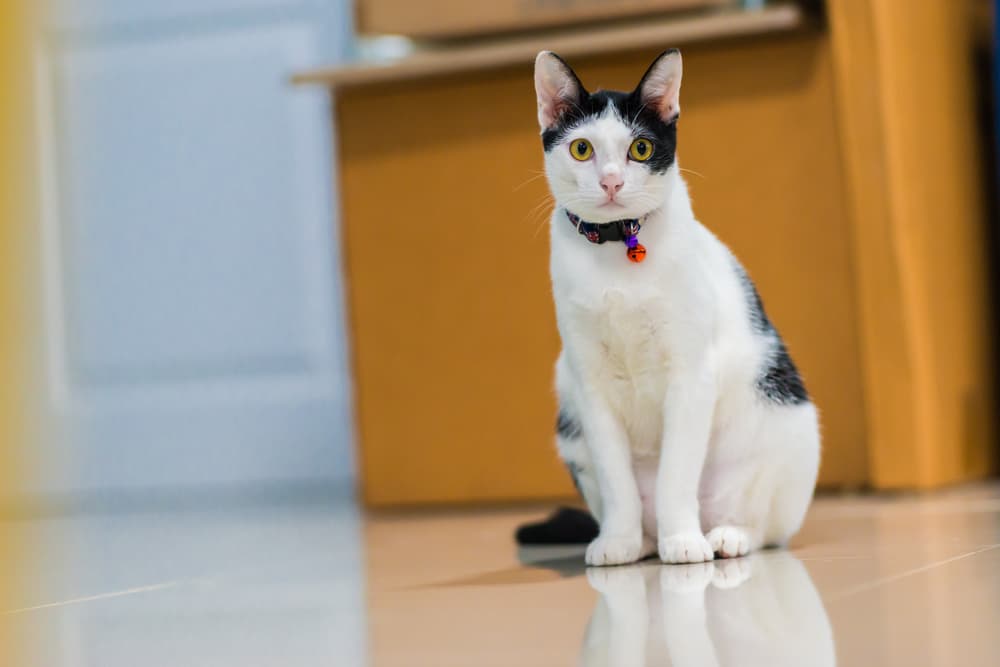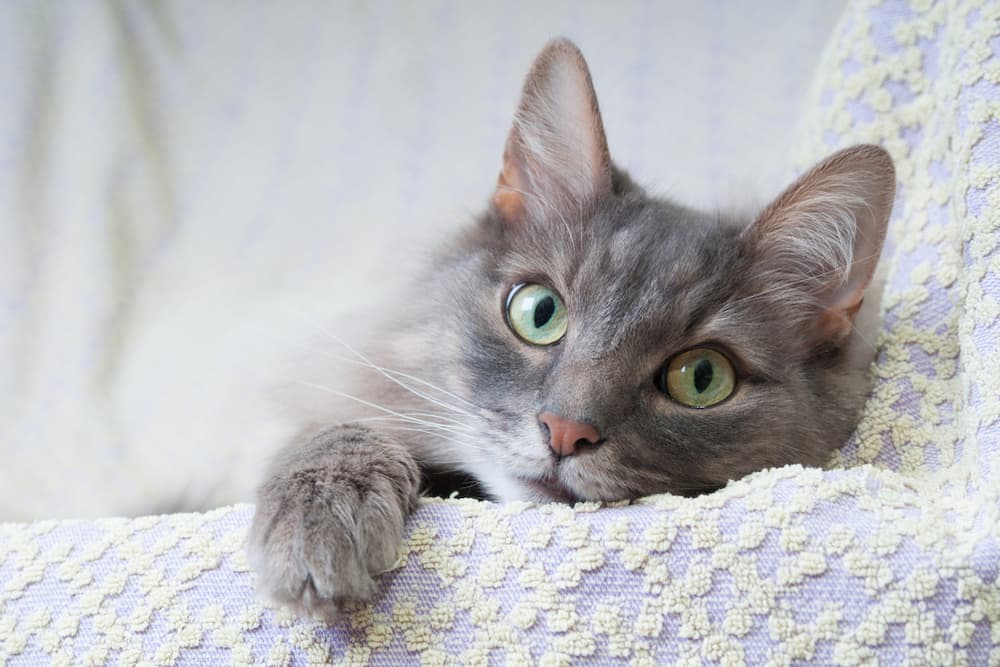All About Cat Panting

On a hot summer day, it’s certainly not uncommon to see dogs out on walks, panting excessively with their tongues hanging out. This is a common cooling mechanism for dogs and one widely accepted as normal.
However, this is not the case for our feline friends and we do worry more if we see cats panting.
While there are certain instances in which panting can be normal, there are others that signal potentially serious problems in which veterinary care and attention is a must.
Let’s learn a little more about cat panting, including what it means and when to involve your veterinarian.
Do Cats Pant?

Technically, yes, cats do pant. However, unlike dogs who actively pant after exercise to cool off, cats typically don’t pant after playing. In the rare instance that they do, it is typically very closely associated with heavy exertion, lasts a very short time, and then quickly resolves.
Panting in cats outwardly looks very similar to panting in dogs—cats will breathe with their mouth open and tongue out, making louder breath sounds than normal.
While any cat can physically pant, certain breeds of cats are more susceptible to panting, either because of their respiratory anatomy or because of their hair coat. These cat breeds include Himalayans and Persians who have a flatter face and more narrow nostrils, and Maine Coons and other long-haired breeds.
Why Do Cats Pant?

A cat’s body is very efficient and they typically do NOT breathe through their mouths. So, when we see a cat panting, it typically means something is off. The key is to assess the entire situation surrounding the panting episode to see if it is related to a “normal” cause of panting or an “abnormal” cause triggered by an underlying medical condition.
Normal causes of panting in cats can include:
- Very recent heavy play
- A new stressor like construction in the home or a new houseguest or pet
- Anxiety from travel
- Overheating
There are certain instances in which cats may pant for a very short period of time. These “normal” scenarios can include when a cat is anxious, stressed, overheated, or just did strenuous exercise.
However, it’s important that if you see your cat panting in these scenarios, you should intervene and allow your cat to rest, relax, or cool down. If your cat doesn’t settle and continues to pant, it’s time to immediately see your veterinarian.
Abnormal causes of cat panting include many medical conditions such as:
- Respiratory disease
- Asthma
- Congestive heart failure
- Heartworm disease
- Anemia (low red blood cell count)
- Trauma
- Neurologic disease
- Distended abdomen
- Severe pain
Unlike normal panting, abnormal panting in cats typically starts spontaneously or without any trigger. It also does not resolve quickly with rest or removal of the stressor or heat and is typically associated with other abnormal behaviors like coughing, lethargy, and an increased effort to breathe. We can see abnormal panting in any age of cat, but often kittens and senior cats are more easily affected.
Common Causes of Abnormal Cat Panting

Unfortunately, respiratory distress is one of the most common reasons that we see felines on an emergency basis. Many times, excessive panting and other worrisome behaviors are associated with an underlying disease.
Here are some of the most common primary causes of abnormal panting in cats:
Asthma
Many feline pet parents are shocked to hear that this common human ailment can also be found in their feline fur babies too! Feline asthma affects anywhere to 1-5 percent of all cats and is thought to be a condition in which a cat’s body creates an allergic reaction to inhaled particles from the environment, causing constriction and narrowing of the airways in the lungs.
Cats with asthma will often cough, wheeze, pant, or breathe at a much faster rate than normal and they may even vomit. There are varying levels of severity to this condition in cats, but just like in people, this can become life-threatening during an asthma attack. Thankfully, cat asthma can be well controlled through using inhaler therapy for delivery of steroids into the lungs and also using bronchodilators.
Congestive Heart Failure

Also very similar to dogs and people, cats can have many different forms of heart disease that lead to fluid backup and accumulation in and around the lungs, one of the key findings in congestive heart failure. The frustration for many veterinarians and feline pet parents is that many cats can have heart disease that can go undetected until an episode of complete failure.
This is especially true with hypertrophic cardiomyopathy (or HCM). In this condition, the heart muscle thickens, becomes less flexible and, due to its size, has to beat much faster and inefficiently. This disease, especially prevalent in the Maine Coon breed, can cause a cat to have difficulty breathing, panting, coughing, decreased appetite, weight loss, and in advanced cases, risk of blood clots being formed and going to other parts of the body.
Treatment in emergencies include oxygen therapy, diuretics (medication to help remove fluid from the lungs), medication to help slow down the heart rate and allow more efficient heart beats, aspirin to help prevent blood clots and other life-saving strategies.
Respiratory Infection
Cats can also develop different respiratory infections within the nasal passages and lungs themselves from viruses, bacteria, and even fungal organisms. When these infectious agents take up residence in the respiratory system, the body’s immune system mounts a large inflammatory response to try and fight the disease, creating a situation very similar to an asthmatic cat.
Cats experiencing inflammation from a respiratory infection will also have difficulty breathing (either too fast or with too much effort), may cough, pant, and be very lethargic.
Depending on the cause, we treat these cats with oxygen therapy, antibiotics, and humidifiers or steam therapy to try and clear the nasal passages. Upper respiratory viral infections, like Herpes and Calicivirus, can be especially challenging for young kittens without aggressive support.
Heartworm Disease

While heartworm disease is something we mostly associate with canines, cats can also be infected with heartworm after a bite from an infected mosquito. While many pet parents wonder how their indoor cat would be exposed to this disease, I often ask them how many times their cat lounges in a windowsill with the window open and how many mosquitoes they have found inside their homes.
Heartworm positive cats may cough, pant, and experience labored breathing. Sadly, there is no definitive cure for this disease in cats and it can often be fatal. However, we do try to treat these cats with oxygen therapy and steroids to reduce the inflammation caused by this parasite.
Talk to your veterinarian about the available monthly heartworm preventatives for cats that can prevent heartworm disease in your furry family member.
Anxiety
Anxiety in cats is often a common cause of normal feline panting but can become a source of abnormal panting if ongoing within the home or with prolonged travel. If you notice your cat showing other signs of stress associated with panting like overgrooming, inappropriate urination, hissing, hiding, and changes in appetite, talk to your veterinarian about available anti-anxiety strategies that could include behavioral modifications, pheromone therapy (calming hormones to keep in the home or around carrier) and even anxiety medications and calming aids.
Other causes of abnormal panting in cats include:
- Trauma
- Severe pain
- Disease in the brain or spinal cord
- A distended abdomen
- Some toxicities
When to Consult a Veterinarian about Cat Panting

If your cat is panting, it should be considered an emergency if it occurs spontaneously, doesn’t resolve quickly (in a matter of a few minutes), and is accompanied by coughing, difficulty breathing, and/or lethargy.
I always tell clients, when in doubt, to err on the side of caution. Call your veterinarian, request a virtual telemedicine video chat, or go directly to the office for assessment.
On the way to the veterinarian or the emergency clinic, make sure your cat is in a secured, travel-safe carrier that you can easily see through. Keep the car temperature cool and play soft music to help relax them as much as possible. Give your veterinary practice a call ahead of time to alert your arrival so that they can be best prepared for your arrival with oxygen therapy and other life-saving measures if necessary.









